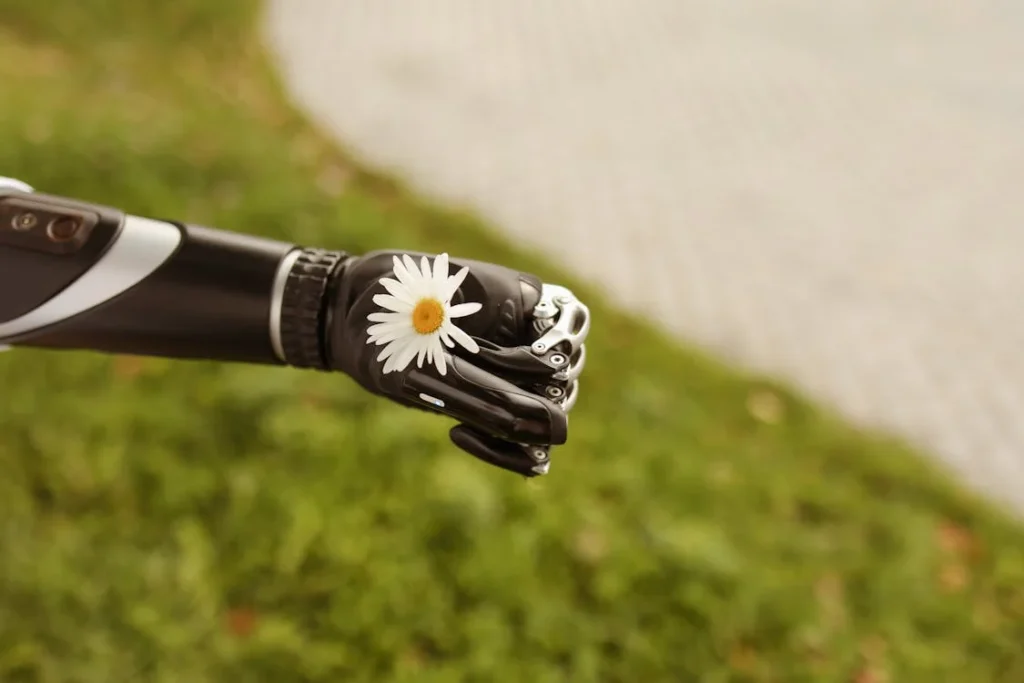Caring for your prosthetic is essential for its longevity and performance, but it’s equally important to do so in an eco-friendly way. Sustainable maintenance practices not only protect the environment but also contribute to a healthier relationship with your prosthetic. By adopting eco-friendly habits, you can reduce waste, conserve resources, and ensure your prosthetic remains reliable while minimizing its impact on the planet.
In this guide, we’ll explore actionable, sustainable strategies to care for your prosthetic without compromising its functionality. From using environmentally safe cleaning solutions to recycling components responsibly, these tips will help you integrate sustainability into your maintenance routine with ease.

Understanding the Importance of Eco-Friendly Prosthetic Care
Eco-friendly prosthetic care goes beyond individual responsibility—it’s a commitment to preserving the environment while ensuring the long-term functionality of your device.
As the demand for advanced prosthetics grows, so does the environmental impact of production, maintenance, and disposal.
By adopting sustainable practices, users contribute to a healthier planet while reaping the benefits of improved durability, reduced costs, and more meaningful connections to their devices.
Reducing Environmental Impact
The materials and processes involved in manufacturing, maintaining, and disposing of prosthetics can have a significant environmental footprint.
Components made from plastics, metals, and composites often require energy-intensive production methods, and improper disposal can contribute to landfill waste.
Adopting eco-friendly care practices minimizes this impact by reducing waste, promoting recycling, and encouraging the use of biodegradable or non-toxic materials.
Each small change you make in how you care for your prosthetic contributes to a larger effort to protect the planet.
Enhancing Longevity Through Sustainable Practices
Sustainable care doesn’t just benefit the environment—it also enhances the lifespan of your prosthetic. By using methods that are gentle on materials and avoiding harsh chemicals, you can preserve the integrity of your device for longer periods.
This reduces the need for frequent replacements or repairs, saving both resources and costs over time.
Addressing the Environmental Footprint of Prosthetics
Prosthetic devices are made from a variety of materials, including plastics, metals, and composites. While these materials are chosen for their durability and performance, their production often involves energy-intensive processes and significant resource consumption.
Additionally, improper disposal of old prosthetics and components can lead to waste accumulation and environmental harm.
Eco-friendly care practices tackle these challenges by promoting resource conservation and waste reduction.
For example, using biodegradable cleaning products reduces chemical pollution, while recycling worn-out components prevents them from ending up in landfills.
Each small action taken during maintenance contributes to a larger effort to mitigate the environmental impact of prosthetic care.
Preserving Resources Through Longevity
One of the key benefits of eco-friendly prosthetic care is its focus on longevity. Sustainable practices, such as gentle cleaning methods and preventive maintenance, ensure that prosthetics remain functional for longer periods.
This reduces the need for frequent repairs or replacements, conserving both resources and energy.
For instance, routine cleaning with non-toxic solutions prevents dirt and debris from causing premature wear, while regular inspections identify minor issues before they escalate into significant problems.
By prioritizing these practices, users not only protect their investment but also reduce the demand for new materials and manufacturing processes.
Supporting a Circular Economy
Eco-friendly prosthetic care aligns with the principles of a circular economy, where resources are reused and repurposed rather than discarded.
By recycling old components, donating usable devices, and choosing products made from sustainable materials, users contribute to a system that minimizes waste and maximizes value.
For example, many prosthetic parts, such as metal joints or carbon fiber frames, can be refurbished and reintegrated into new devices.
Organizations and manufacturers are increasingly offering take-back programs to ensure that these materials are responsibly processed. By participating in these initiatives, users play an active role in creating a sustainable prosthetic ecosystem.
Empowering Users Through Sustainability
Adopting eco-friendly prosthetic care practices empowers users to take control of their environmental impact. These practices encourage mindfulness, fostering a deeper sense of responsibility and connection to the world around them.
Knowing that their actions contribute to a greener future gives users a sense of purpose and pride, reinforcing the importance of sustainable living.
For families and young users, eco-friendly care also serves as an opportunity to instill environmental values.
By teaching children how to care for their prosthetics in a sustainable way, parents encourage habits that extend beyond prosthetic maintenance to encompass broader ecological awareness.
Advancing the Industry Toward Sustainability
The collective efforts of users, manufacturers, and care providers are driving the prosthetics industry toward greater sustainability.
As demand for eco-friendly solutions grows, manufacturers are developing innovative materials, designing devices for easier recycling, and exploring energy-efficient production methods.
Eco-friendly prosthetic care is not just a trend—it is a necessity for ensuring a sustainable future while empowering users to take pride in their role as caretakers of their devices and the environment.
By understanding the impact of your choices and embracing sustainable practices, you can make a difference in both your personal life and the world at large.

Eco-Friendly Cleaning Solutions
The way you clean your prosthetic has a significant impact on its performance, longevity, and the environment. Eco-friendly cleaning solutions offer a sustainable alternative to traditional methods, allowing you to maintain your device without contributing to environmental harm.
These solutions are not only safer for the planet but also gentler on the materials and your skin, ensuring effective care that aligns with sustainability goals.
Choosing Biodegradable Cleaning Products
Traditional cleaning agents often contain harsh chemicals that can harm the environment when washed away into water systems. Switching to biodegradable or plant-based cleaning solutions ensures that your prosthetic is cleaned effectively without contributing to pollution.
These eco-friendly products are gentle on both the prosthetic’s materials and your skin, making them an excellent choice for users with sensitive skin or allergies.
Look for certifications like “non-toxic” or “eco-friendly” on cleaning products to ensure they meet sustainable standards.
For a homemade alternative, a mixture of mild soap and warm water can be used to clean non-electronic components. This simple solution is effective in removing dirt and grime while being safe for the environment.
Minimizing Water Waste
While cleaning your prosthetic, be mindful of water usage. Instead of running the tap continuously, use a basin or bowl to rinse components. This reduces water waste and ensures you use only what is necessary.
Dry components with a reusable microfiber cloth instead of disposable paper towels. Microfiber cloths are durable, absorbent, and eco-friendly, making them a practical addition to your sustainable maintenance toolkit.
The Case Against Harsh Chemicals
Many conventional cleaning agents contain harsh chemicals, such as ammonia, bleach, or synthetic fragrances, that can harm both your prosthetic and the environment.
These chemicals often leave residues that can degrade materials over time, weakening components or causing discoloration. Additionally, when washed away, these substances can enter waterways, contributing to pollution and harming aquatic ecosystems.
Switching to eco-friendly alternatives helps eliminate these risks. Plant-based and biodegradable cleaning products are free from toxic chemicals, ensuring that your prosthetic remains in excellent condition without endangering the environment.
These products break down naturally, leaving no harmful residues behind.
For users with sensitive skin, eco-friendly cleaners offer another advantage. Their gentle formulations reduce the risk of irritation, making them ideal for prosthetics that come into direct contact with the skin, such as liners or sockets.
Homemade Cleaning Solutions
For those seeking a cost-effective and sustainable option, homemade cleaning solutions are an excellent choice. A simple mixture of warm water and mild soap can effectively remove dirt, oils, and bacteria from most non-electronic prosthetic components.
For stubborn grime, adding a small amount of vinegar or baking soda creates a natural cleaning agent that is both powerful and environmentally friendly.
When using homemade solutions, it’s important to test them on a small, inconspicuous area of your prosthetic first. This ensures compatibility with the materials and prevents unintended damage.
Consulting your prosthetist for advice on suitable cleaning agents can also help you make informed choices.
The Role of Specialized Eco-Friendly Products
The market for eco-friendly prosthetic care products has grown significantly in recent years, offering specialized options tailored to the unique needs of prosthetic devices.
For example, water-based lubricants designed for moving joints provide effective performance without introducing harmful residues. Similarly, cleaning sprays formulated specifically for liners and sockets ensure hygiene while protecting the environment.
Using these products not only simplifies your maintenance routine but also contributes to a greener future.
Many eco-friendly cleaning brands emphasize sustainable production practices, such as using recyclable packaging or sourcing ingredients responsibly, further reducing their environmental impact.
Water Conservation During Cleaning
Effective cleaning doesn’t always mean using large amounts of water. By adopting mindful cleaning practices, you can reduce water waste without compromising results.
For instance, soaking removable components in a basin instead of rinsing them under running water helps conserve resources. Similarly, using a damp cloth to clean external surfaces ensures thorough care while minimizing water use.
Air drying is another eco-friendly alternative to energy-intensive methods like using a hairdryer. Placing your prosthetic components in a well-ventilated area allows them to dry naturally, reducing your energy consumption and environmental footprint.
Sustainable Cleaning Tools
Choosing the right tools is just as important as selecting eco-friendly cleaning solutions.
Reusable items such as microfiber cloths, silicone brushes, and washable sponges are durable and effective, eliminating the need for disposable cleaning supplies like paper towels or single-use wipes.
These tools are designed to last, reducing waste and offering consistent performance over time.
When cleaning hard-to-reach areas, consider using small, eco-friendly brushes with soft bristles. These brushes allow you to remove debris from joints and crevices without damaging the prosthetic’s materials.
By investing in high-quality, reusable tools, you not only enhance your maintenance routine but also support sustainable living.
Combining Hygiene with Sustainability
Eco-friendly cleaning solutions are about more than just sustainability—they’re also about ensuring your prosthetic remains hygienic and comfortable to use.
By adopting gentle, non-toxic cleaning practices, you reduce the risk of skin irritation, bacterial growth, and material degradation.
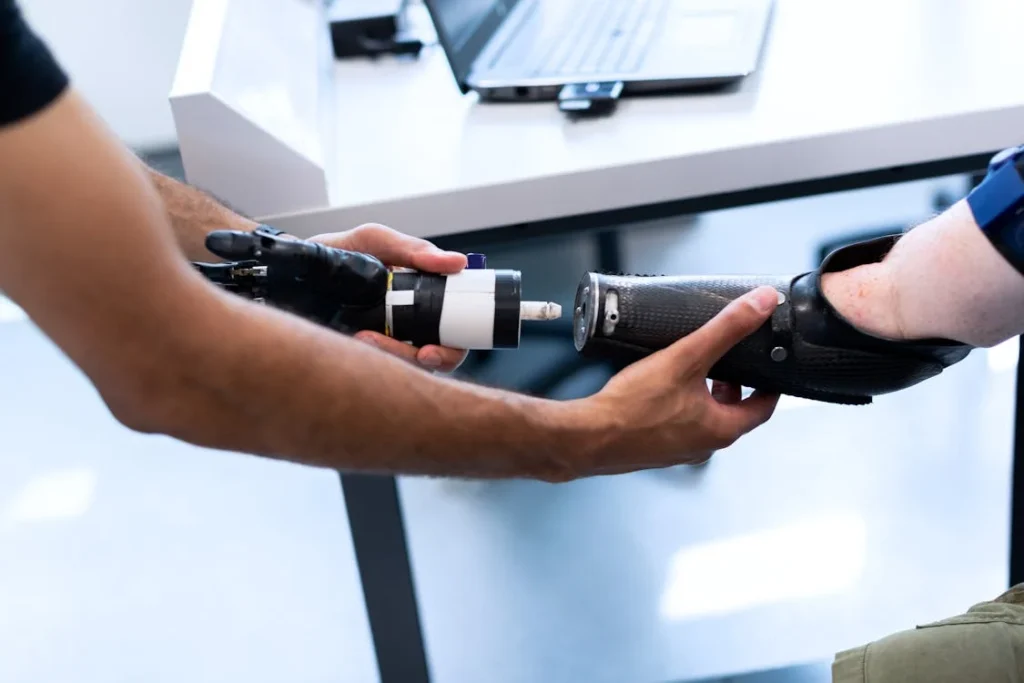
Reducing Waste During Maintenance
Sustainable prosthetic care involves more than just cleaning and upkeep—it’s about minimizing waste and conserving resources throughout the maintenance process.
Waste reduction not only supports environmental stewardship but also makes prosthetic care more cost-effective and efficient.
By adopting intentional practices and choosing sustainable alternatives, users can ensure their prosthetics remain in excellent condition without contributing to unnecessary waste.
Reusable Tools and Supplies
One of the easiest ways to adopt eco-friendly prosthetic care is by choosing reusable tools over disposable alternatives. Items like microfiber cleaning cloths, silicone-based scrubbers, and washable liners help reduce waste while maintaining excellent hygiene.
These durable products can be cleaned and reused multiple times, significantly cutting down on the amount of single-use materials that end up in landfills.
When it comes to lubricants or protective coatings, opt for products that come in refillable containers. Many brands now offer sustainable packaging options that allow you to reuse the original bottle while purchasing refills. This simple switch helps reduce plastic waste over time.
Efficient Use of Cleaning Agents
Overuse of cleaning agents not only depletes resources but can also leave residues that affect your prosthetic’s performance. By measuring cleaning solutions carefully and using only the amount required, you ensure your prosthetic remains clean without unnecessary waste.
Diluting concentrated eco-friendly cleaners is another effective strategy. Many biodegradable cleaning products are designed to be mixed with water, allowing you to adjust the strength as needed for different cleaning tasks.
This approach maximizes the product’s lifespan and reduces packaging waste.
Extending Component Lifespan
Regular maintenance that prioritizes sustainability helps extend the life of individual prosthetic components. For instance, cleaning liners and sockets thoroughly but gently prevents wear and tear, reducing the need for frequent replacements.
Inspecting your prosthetic regularly for minor issues, such as loose screws or worn seals, allows you to address these concerns early, preventing further damage and avoiding unnecessary waste.
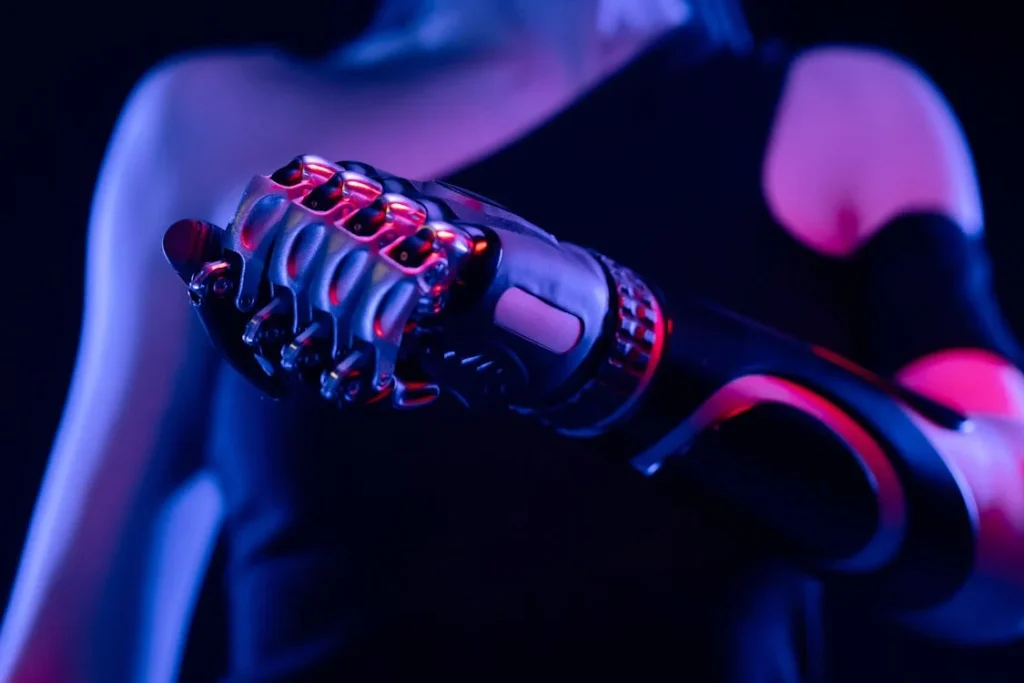
Responsible Disposal of Prosthetic Parts
The disposal of prosthetic parts plays a significant role in ensuring environmental sustainability. While prosthetics are designed for durability, their components will eventually reach the end of their usable life.
How these parts are handled after use can either contribute to environmental harm or support eco-friendly practices.
Responsible disposal focuses on minimizing waste, promoting recycling, and exploring ways to extend the usefulness of materials through repurposing and innovation.
Recycling Old Components
When components of your prosthetic reach the end of their lifespan, disposing of them responsibly is crucial for sustainability. Many prosthetic parts, such as metal joints or carbon fiber frames, can be recycled, reducing the demand for new raw materials.
Check with local recycling facilities to see if they accept prosthetic materials or consult your prosthetist for guidance on eco-friendly disposal options.
Some manufacturers and organizations also offer take-back programs for used prosthetic parts. These programs repurpose or recycle components, ensuring they don’t end up in landfills.
Disposing of Electronics Responsibly
Electronic prosthetics require special attention when it comes to disposal. Batteries, sensors, and other electronic components often contain materials that can harm the environment if discarded improperly.
Work with e-waste recycling facilities to ensure these components are processed safely.
To make this process easier, maintain records of your prosthetic’s materials and components. Knowing what your device contains allows you to follow the appropriate guidelines for eco-friendly disposal.
Understanding the Complexity of Prosthetic Components
Prosthetic devices are composed of various materials, including metals, plastics, composites, and electronics. Each of these materials requires specific disposal methods to prevent environmental damage.
For instance, metals like aluminum or titanium are highly recyclable, but improper disposal can lead to valuable resources being wasted. Plastics and composite materials, on the other hand, are often more challenging to recycle due to their specialized manufacturing processes.
Electronic prosthetics introduce an additional layer of complexity. Batteries, sensors, and circuit boards contain components that may be harmful if discarded in regular trash. Proper disposal of these elements is essential to prevent toxins from leaching into soil or water systems.
Donating Usable Prosthetics and Components
Another avenue for responsible disposal is donation. Prosthetics that are no longer needed but remain functional can be donated to organizations that refurbish and redistribute them to individuals in need.
This approach not only reduces waste but also provides life-changing assistance to people who may not have access to advanced prosthetic technology.
Even if the entire device is not usable, individual components like sockets or liners may still have value. Nonprofits and community clinics often accept these parts for reuse or recycling, ensuring they continue to serve a purpose instead of being discarded.
Before donating, it’s essential to ensure that the prosthetic meets the receiving organization’s criteria for condition and compatibility. Proper cleaning and inspection of the device also help maintain its quality and safety for future users.
Addressing Challenges with Composite Materials
Composite materials, such as carbon fiber, present unique challenges in disposal due to their durability and specialized production methods.
While their strength and lightweight properties make them ideal for prosthetic design, they are not as easily recyclable as metals or standard plastics.
Innovative recycling methods are emerging to address these challenges. Some facilities now offer processes that break down composite materials into reusable fibers or resins.
Partnering with such programs ensures that even complex materials are handled in an environmentally responsible way.
Safe Disposal of Hazardous Components
Certain prosthetic parts, such as electronic components or adhesives, require special attention during disposal. Batteries, in particular, can pose environmental risks if not handled correctly, as they may contain chemicals like lithium or cadmium.
Users should never dispose of batteries in regular trash. Instead, look for e-waste programs or designated battery collection points in your area.
Similarly, adhesives or sealants used in prosthetic assembly should be disposed of following the manufacturer’s recommendations to prevent environmental harm.
Prosthetists and manufacturers can provide guidance on the safe disposal of these hazardous components, ensuring compliance with environmental regulations and best practices.
The Role of Manufacturers in Responsible Disposal
Manufacturers play a critical role in supporting responsible disposal. By designing prosthetics with sustainability in mind, they can make it easier for users to recycle or repurpose parts.
Features such as modular components, standardized materials, and clear labeling enhance the recyclability of prosthetics and reduce waste.
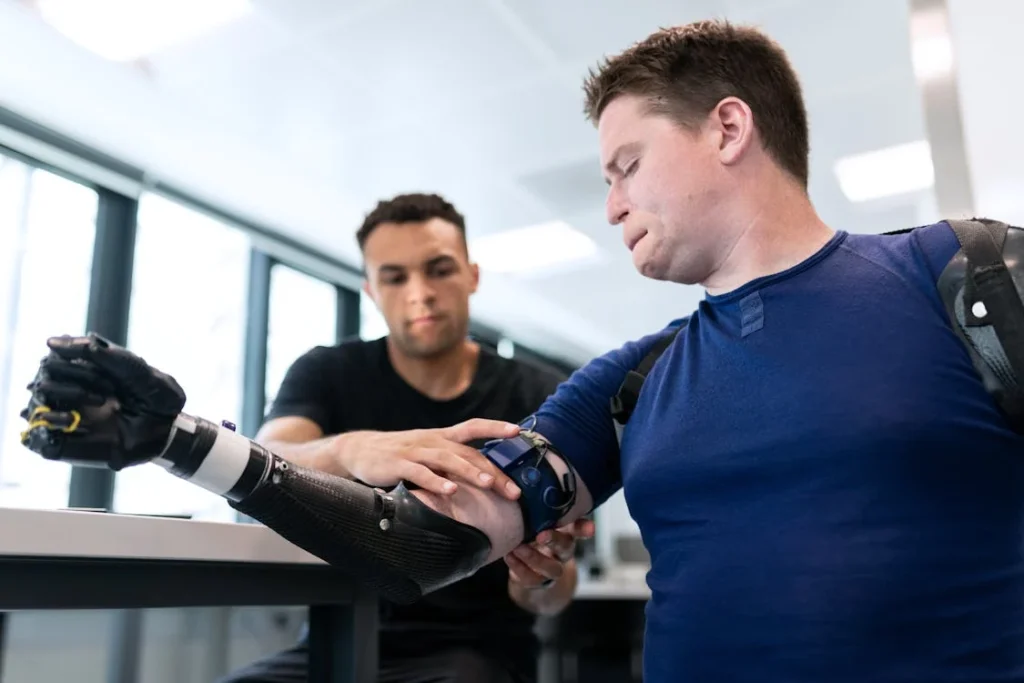
Sustainable Habits for Long-Term Care
Caring for your prosthetic sustainably is not just a practice but a mindset that combines environmental awareness with the desire to enhance the longevity and performance of your device.
Developing sustainable habits for long-term care ensures that your prosthetic remains functional while reducing its impact on the environment.
These habits focus on thoughtful use, regular maintenance, and proactive planning, creating a balance between durability and eco-consciousness.
Prioritizing Preventive Maintenance
Preventive maintenance is one of the most sustainable approaches to prosthetic care.
By addressing small issues early, such as tightening screws or replacing worn liners, you reduce the risk of larger problems that require extensive repairs or replacements. This not only conserves resources but also saves time and money in the long run.
Establish a regular maintenance schedule that aligns with your prosthetic’s usage and environmental exposure. For example, a prosthetic frequently used in outdoor settings may require more frequent cleaning and inspections than one used primarily indoors.
Staying proactive ensures your device remains functional and reduces the overall need for new parts.
Reducing Carbon Footprint
Consider how your maintenance practices contribute to your overall carbon footprint. For example, consolidating visits to your prosthetist with other errands minimizes travel-related emissions.
Additionally, choosing locally sourced or manufactured components reduces the environmental impact associated with long-distance shipping.
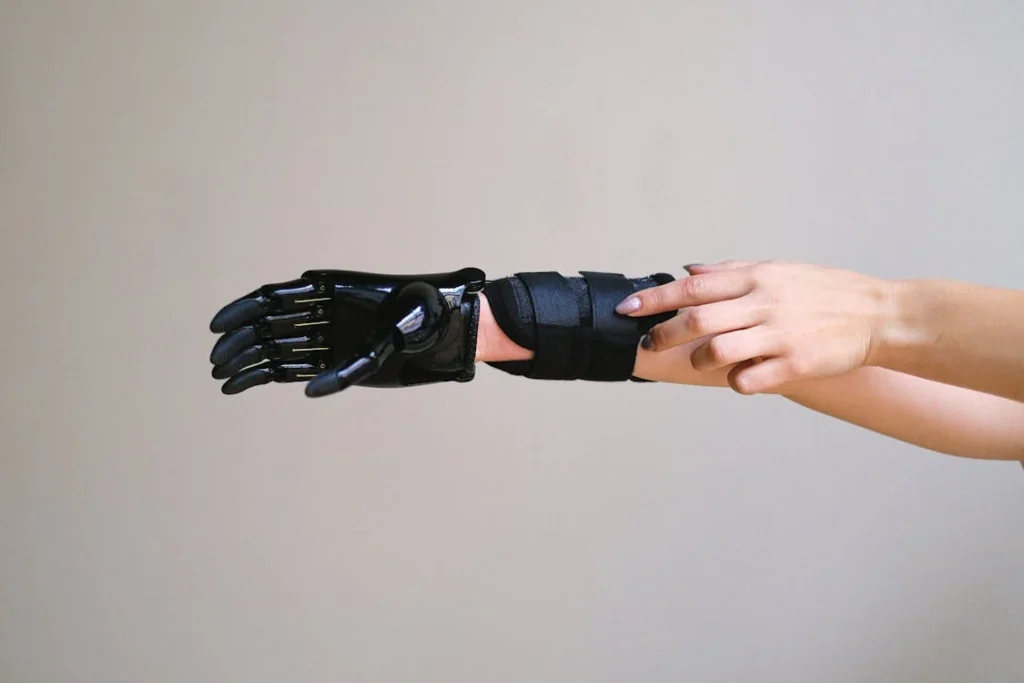
Embracing Innovation in Sustainable Prosthetics
The evolution of prosthetics is entering a new era, one defined by the integration of sustainability into every stage of the device lifecycle.
From design and material selection to maintenance and disposal, innovation is transforming how prosthetics are developed and used with an emphasis on minimizing environmental impact.
By embracing these advancements, users and manufacturers alike can contribute to a future where mobility solutions are as eco-friendly as they are effective.
Advances in Eco-Friendly Materials
The prosthetics industry is evolving to incorporate eco-friendly materials that reduce environmental impact without compromising performance.
Innovations such as biodegradable polymers, recycled composites, and lightweight bamboo-based materials are paving the way for more sustainable prosthetic designs.
By choosing prosthetics made with these materials, users can contribute to a circular economy where resources are reused and repurposed.
Additionally, manufacturers like Robobionics are investing in research to create materials that are both durable and environmentally conscious, ensuring sustainability is integral to the prosthetic lifecycle.
The Role of Technology
Technology plays a significant role in promoting sustainable prosthetic maintenance. Smart prosthetics equipped with sensors and connectivity tools can monitor their own condition, alerting users when maintenance is needed.
This reduces unnecessary interventions and ensures care is applied only when required, conserving resources.
Conclusion
Sustainable prosthetic maintenance is about more than preserving the environment—it’s about creating a harmonious balance between functionality, longevity, and responsibility. By adopting eco-friendly practices such as using biodegradable cleaning solutions, minimizing waste, and recycling components, users can reduce their environmental footprint while ensuring their prosthetic remains reliable and comfortable.
At Robobionics, we are dedicated to designing prosthetics that not only enhance mobility but also promote sustainability. By embracing eco-friendly habits and leveraging modern advancements, you can contribute to a greener future without compromising the care your prosthetic deserves. Together, we can create a world where prosthetic maintenance is both impactful and environmentally conscious. Contact us today to learn more about our sustainable prosthetic solutions and take the first step toward responsible care.



